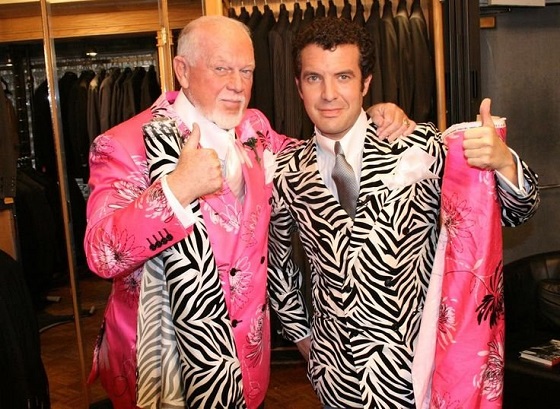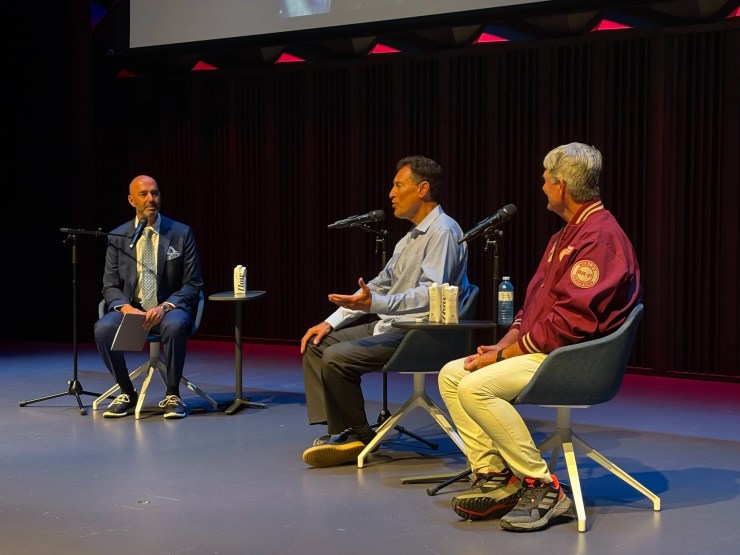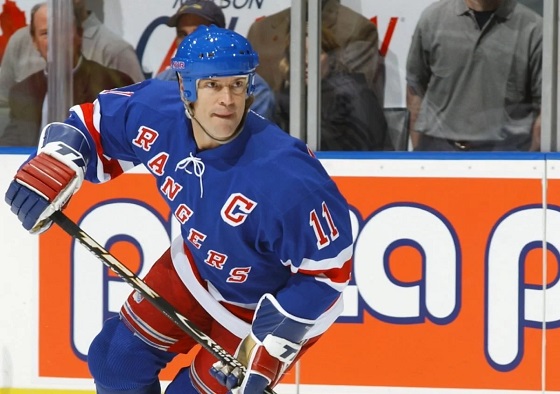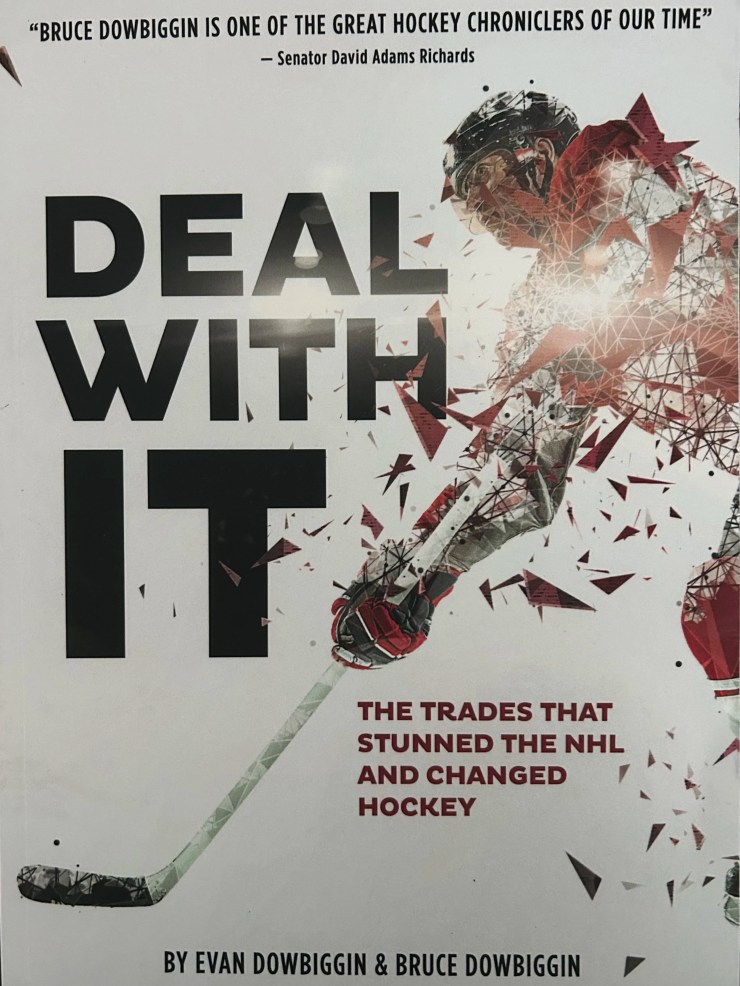Bruce Dowbiggin
Don & Rick: Canadian Icons, Mixed Messages, Lasting Impacts

“Well, Tim, this is our last show. . . . Thanks everybody for listening and toodaloo,” 91-year old Don Cherry allegedly on his final podcast episode.
Once upon a time in a public broadcaster far, far away there was an identity crisis. Who should we be as we enter the 21st century? We depend on government for our financing, but our audience relies on people who hate government.
At CBC that argument could be summed up by two figures on the TV network. Rick Mercer. Don Cherry. Both were brilliant communicators, masters of the craft of holding eyeballs. But they represented diametrically opposed audiences. Mercer was the glib political voice of This Hour Has 22 Minutes. Cherry was the bombastic voice of Hockey Night in Canada, as Canadian as the brown beer stubby.
Mercer was worshipped by the folks in the C suite and liberal media. With his searing walking shots he lanced egos and asked uncomfortable questions. He called out sacred cows. Yet there was never any doubt in CBC’s upper reaches about whose side he was on in the culture war at CBC. He was safe.
Cherry was the unpredictable occupant of Coach’s Corner, the bombastic voice of white anglo hockey culture. He was abrasive and unforgiving. His first-period rants beside his Topo Gigio Ron Maclean were must-watch for the demographic. They also, it seemed, constituted must watching for his critics.
[Confession: I was one of his critics, paid to be so. We tangled often over his act. He ripped me in the 2004 NHL playoffs, alleging I said he was insincere about kids with cancer. During the infamous 1987 World Junior brawl he said I was a coward who wouldn’t defend his own kids in a fight. etc. He sicced his bots on me. While I disagreed with much of what he said, I defended his right to say such things. My beef was mostly with HNIC which refused to allow any dissent to Cherry’s act on the show . It was a noisy one-note symphony.

Don was durable, holding his prime position for decades, putting himself above the title many Saturdays with headline material. In the sea of pearl clutchers at CBC he stood out. While the suits above recoiled at his Canadian Legion catechism, they also knew he was an asset they could play when they went for funding in Ottawa. “See, we have all sorts of political views on the network.”
When CBC lost its HNIC franchise to Sportsnet Cherry became someone else’s problem. Eventually the Woke folk at Rogers tired of telling him to knock off the politics and cultural stuff. He was let go in 2019 for saying what he’d always said. Maclean then put in the knife to save his own hide.
Mercer’s highly rated act continued unabated till 2018. One of his most popular gigs— the one most likely to appeal to posh Canadians— was talking to Americans about Canada. It was brilliant in its simplicity. Go to famous colleges and universities to plumb the depths of their Canadian knowledge. Likewise, buttonhole well-known American politicians.

The topics were many and ridiculous. Should Canada protect the famous location Joe Clark’s Hole? What should Canada do about its melting national igloo? Could they congratulate Jean Chretien on a rare political feat called a “Double Double” in which he received support from both sides of the Canadian parliament.
He asked Al Gore about Canada moving the capital city from Kingston, Ontario to Toronto (Gore thought it smart). He convinced tourists at Mount Rushmore that the mineral rights to the mountain had been sold to a Canadian firm that was getting ready to drill for oil in Lincoln’s forehead.
He asked Americans to condemn Canada’s practice of euthanizing senior citizens by setting them adrift on Northern ice floes. In a famous moment, future President George W. Bush failed to correct Mercer when he referred to Chrétien as “Jean Poutine”
Mercer always said he didn’t think Americans were ignorant. Eighty percent had the right responses and those never made it to air. For the rest it was just that they couldn’t resist an open mike and having a take on things they knew nothing about. He had affection for them.
For Canada’s Left, insecure in its northern faculty-lounge, that subtlety was lost. Mercer’s routines reinforced a smug anti-American attitude in the Liberals and NDP base. All they saw was a nation of nitwits. “Look, what bozos!” The orientation of the fashionistas turned away from the U.S. to supposed European sophistication and societal controls for climate, population growth and Covid. Hello, Mark Carney.
This bias was reinforced by the increasingly self-loathing voices on the cable news of the American Left. Every GOP figure from George W. Bush till Trump today became a comic character. Canadian lefties adored it. As we’ve written often the snide attitude allowed Canadians to ignore that Americans were protecting them for free and keeping them rich. And taking the overflow from Canadian’s prized healthcare system.
This arrogance culminated in the March election where the mere mention of Trump sent Canadians fleeing back to a Liberal administration that was moribund after a decade of incompetence. It has an echo in Toronto’s Hockey Hall of Fame again declining to award Cherry the Foster Hewitt award as a legendary TV journalist. Love him or hate him he’s earned it. It’s arguable whether the aging Cherry will even be around to be chosen next year.
For sure his political impact will resonate for long after he’s gone in the populist resurgence in western Canada and elsewhere. If only Rick Mercer were allowed back on CBC to cover it.
Bruce Dowbiggin @dowbboy is the editor of Not The Public Broadcaster A two-time winner of the Gemini Award as Canada’s top television sports broadcaster, his new book Deal With It: The Trades That Stunned The NHL And Changed hockey is now available on Amazon. Inexact Science: The Six Most Compelling Draft Years In NHL History, his previous book with his son Evan, was voted the seventh-best professional hockey book of all time by bookauthority.org . His 2004 book Money Players was voted sixth best on the same list, and is available via brucedowbigginbooks.ca.
Alberta
In Federal vs Provincial Battles, Ontario In No Longer A Great Ally For Alberta

Alberta Could Make A Deal With Bill Davis’ Ontario. Just One Problem.
Last month my friend Steve Paikin and I did a public appearance at the lovely Oshawa Town Square, recalling the highlights of our careers and the stories behind the stories. One of Steve’s stories was the subject of one of his 847 books, Bill Davis, the former premier of Ontario from 1971-1985.
He came to power the year our family moved to Ontario, so we watched his arc in power, from centrist Conservative to key figure in the interminable constitutional wrangles of the time. He typified a no-drama approach long before Barack Obama adopted it. His most controversial move was granting equal funding to Catholic schools. And smoking a pipe.
Which led me to ask Steve, the Most Ontario Man In The World, if it was still the same “place to stand, place to grow” province that Davis ruled. If anyone should know, the former TV Ontario stalwart was likely that person. Steve said that, generally, he felt that it was similar to what existed in the 70s and 80s. Obviously there were changes, but the mood was similar. After all, they’d elected Conservative Doug Ford three times.

My response? That would make Alberta very happy. Alberta could make a deal with Bill Davis’ Ontario. Why? A Bill Davis Ontario would never tell another province to keep its oil in the ground, to hobble its economy to suit climate obsessions in his own province. A Bill Davis Ontario would support nation-building projects like trans-Canada pipelines not forcing Alberta to sell their oil at a discount to the U.S. A Bill Davis Ontario would never support gun seizures from law-abiding owners.
With respect, Steve, the Bill Davis Ontario is no more. There is no deal to be made at the moment. It is a place captured by the globalist fevers of Great Thunberg climate. It is a province in the thrall of liberal indigenous guilt marinated by its teachers and media. It is a province whose real-estate bubble is poisoning the national economy.
It is a province where politicians and leaders struggle to define a woman. Worst of all, Ontario returned an incompetent trust fund flibberty-gibbet not once, but three times as prime minister. The damage to the nation has been incalculable. Now they’ve elected his economic advisor.
And yet many of our Eastern friends believe that we are the ones who’ve have changed. They tell us we have drunk the cowboy Kool-aid and are now irredeemable. What they mean is, you’re become a traitor to your class. “Down the rabbit hole”. Cast out for being a Bill Davis centrist.
But we have not changed. Much of Alberta’s culture has not changed significantly, despite an NDP episode in government from 2012-15. Bill Davis, who died in 2021, would not find much change outside of the immigrants dropped on it by Justin Trudeau were he to visit today.
But eastern Canada? The whiplash changes might best be summed up by Vince Gasparro, the Liberal MP for a midtown Toronto riding, claiming that Canada’s economy is swell compared to other nations. To which the interim parliamentary budget officer Jason Jacques said just because someone else is 450 pounds and sick doesn’t mean an obese 350-pound person is healthy.

Forecasting a conservative $68.5 billion deficit, Jacques called the economy “unsustainable” and said the nation is at the precipice. “We’re at a point where, based upon our numbers, things cannot continue as they are, and I think everybody knows that,” Jacques said, He was immediately attacked by Liberal bot-world claiming he’s angling for a job with the Conservatives.
The closing of the Laurentian mind reflects what happened to the NDP, the party of Tommy Douglas. Once a national lean-left collection of union workers, farmers, culture figures and academics, it took its lead from the avuncular Ed Broadbent, Audrey McLaughlin and even Jack Layton. Socialist with a friendly face. The leaders calmed the Marxist fevers of their radical fringe.
Then, in the aftermath of Layton’s death, the party convulsed. The union workers and farmers were pushed out by radicals drunk on virtue. Under the DEI hire Jagmeet Singh they purged common sense, leaving Liberals to scoop up their less unhinged members. The survivors of Jagmeet wore keffiyehs in Parliament and predicted environmental doom. The party became irrelevant in 95 percent of the nation.
Their reward was a descent from 103 seats in the 2011 election to non-party status with just seven seats and six percent of the vote this year. While they make noises of relevance, they are now like the Monty Python “Bring out yer’ dead” skit in Search For The Holy Grail.
Which is gravy for the Carney Liberals who can now talk centre but govern as far left as it wishes. Which the Toronto Star says may soon include criminalizing residential school “denialism.” The author Michelle Good says that questioning the unsupported tales of murdered babies is just like “holocaust denial”.
The NDP collapse mirrors what is happening to the Democratic Party in the U.S. By design or by accident Donald Trump has bludgeoned them into assuming most of the policies that are now putting a torpedo into the NDP. Defending crime, endorsing unfettered illegal immigration, patronizing Hamas and other bad actors on the world stage, Balkan economics. Hollywood preening.
While the reviled Trump remains unrepentant, Democrats continue to sink in the polls. Married to California values they’re at 28 percent approval in the polls, and none of their potential 2028 presidential hopefuls is adding anyone to the base.
So the DEMs leadership intimidates its followers with this fatal equation, claiming to be the party of the future. There are a scarce few who remind their colleagues of what’s been lost. Pennsylvania senator John Fetterman who won his crucial seat despite enduring a stroke during the election run-up, is sounding warnings, however.

“Unchecked extreme rhetoric, like labels as Hitler or fascist, will foment more extreme outcomes,” Fetterman wrote. “Political violence is always wrong — no exceptions. We must all turn the temperature down.”
“Absolutely, it’s a reward for Hamas,” he said after Canada and other nations recognized a Palestinian state. “That’s going to be their narrative. They’re going to claim ‘That’s why we did 10/7. That birthed our nation,’ and I can’t ever give that to them.”

But his fellow party members are too engrossed in Jimmy Kimmel’s veneration at BlueSky, the Woke site, to notice that their base has deserted them. Canada’s liberals looking over the edge still get their reinforcement from like-minded people and a bribed media. But as Jacques says, the end is nigh, and everyone knows it.
Bruce Dowbiggin @dowbboy is the editor of Not The Public Broadcaster A two-time winner of the Gemini Award as Canada’s top television sports broadcaster, his new book Deal With It: The Trades That Stunned The NHL And Changed hockey is now available on Amazon. Inexact Science: The Six Most Compelling Draft Years In NHL History, his previous book with his son Evan, was voted the seventh-best professional hockey book of all time by bookauthority.org . His 2004 book Money Players was voted sixth best on the same list, and is available via brucedowbigginbooks.ca.
Bruce Dowbiggin
The McDavid Dilemma: Edmonton Faces Another Big Mess

The 2025-26 NHL season opens this week with one overriding issue: Connor McDavid. Will the best player in this generation stay in Edmonton or go elsewhere? It’s a question that will be asked every day till the playoffs end or McDavid is traded. Naturally Edmonton is having a meltdown. Some are resigned to losing him. Others feel he could sign a bridge deal.
When it comes to losing their stars, Oilers City has been there before. The trade that always gets top billing is the 1988 Gretzky deal to the L.A. Kings, the seismic re-organization of hockey in the late 20th century. Less talked about— but more impactful on the ice— was a trade made this week in 1991 that sent Mark Messier to the New York Rangers. Messier led the Rangers their first Stanley Cup in 1994— their first since 1940. Gretzky never won a Cup away from Edmonton.
Here’s how Messier described the deal in our most recent book Deal With It: The Tales That Stunned The NHL & Changed Hockey:
Calling up GM Glen Sather a couple of months after the 1991 postseason ended to tell him he wanted to move, Messier years later recalled “phoning him was a tough thing. I think it was mid-July. I’d been thinking of this for a while. It wasn’t just the money. I’ve made it clear their offer was pretty good. Certainly enough, where I’d never have to worry again… But I had a gut feeling I wanted to make a change, to go. To try for a new challenge and grow a bit.”
Both sides knew it was just business of course. Messier was correct in assuming he would not enjoy anything close to a sixth Cup if he stayed for a lucrative offer in Edmonton.
“I was delighted with Mark,” Sather would admit about the parting of ways. “He’s a terrific guy to be with and a great player, and it’s sad for me to have to trade him. But it becomes more complicated than that, because of what we’re trying to do here now. I don’t want to be caught in a situation where we’re going to be struggling for five or six years, depending on the draft to get us competitive again. If you analyze the way teams in this league have worked, they’ve all run on cycles. You peak for three or four years, and then go downhill and try to get back up again. And if you don’t trade players you can recover with, then you’re never going to recover. You only have so many assets to make deals with.

Neil Smith, the Rangers general manager who had seen his team endure back-to- back playoff disappointments (beaten both times by the Capitals), got wind of the possibility of landing the great “Moose” over the summer that year. Haggling for weeks toward an eventual deal, Sather would later point out the discrepancies between markets that were tearing apart the NHL at that time, bemoaning that “Maybe they’ll pay (Mark) in New York, maybe Mark is the kind of guy that can attract enough attention to do that. I mean, he’s going to be the matinee idol, he’s Madison Avenue, he’ll be terrific there. He’s the first big superstar they’ve had since Rod Gilbert, so they can afford to pay him whatever they want to pay. We don’t have MSG behind us.”
Edmonton’s training camp in 1991 went on with Messier absent, while he headed to Hilton Head to play golf with his father and brother following the 1991 Canada Cup win. Messier’s sabbatical in the sun ended on the day Edmonton’s season had started. On October 4, 1991, Messier got the call on the 16th tee box at Palmetto Dunes in South Carolina. It was Sather telling him he was headed to Broadway. In the deal, Bernie Nicholls, Steven Rice, Louie DeBrusk and future considerations (completed when the Rangers snagged Jeff Beukeboom for David Shaw) would be coming over in exchange for the vaunted Oiler captain. In the aftermath, an elated Smith hyperbolically called it “the biggest day in the 66-year history of the New York Rangers.” Hundreds and hundreds of miles away to the Northwest, reactions were considerably less enthusiastic.”

The rest was legend. With the media pressure and criticism mounting in the 1994 Conference Final, Messier was asked before the pivotal Game 6 matchup if he guaranteed a win. Responding, “Yes, we will win tonight,” he made what seemed like an innocuous comment at the time. But it was used by a NYC sports media that still lionized when “Broadway” Joe Namath had guaranteed his Jets would pull off the upset of the Baltimore Colts in Super Bowl III in 1969. Newspaper headlines honed in on Messier’s “bold guarantee.” The bravado would fall flatter than a pancake if this bulletin-board quote instead got the Rangers eliminated. Instead, Messier’s performance solidified his legacy as one of the great leaders/captains the sport had ever seen.” And the Rangers carried off the Cup, besting longtime whipping boys Vancouver in seven games.
Will McDavid win a Cup in Edmonton in 2026? Will he, like Messier, get his Cup with a large market team? Or will he be like Gretzky, doomed to play for three more teams without the big prize? This week we start the engines on Edmonton’s worst nightmare.
Bruce Dowbiggin @dowbboy is the editor of Not The Public Broadcaster A two-time winner of the Gemini Award as Canada’s top television sports broadcaster, his new book Deal With It: The Trades That Stunned The NHL And Changed hockey is now available on Amazon. Inexact Science: The Six Most Compelling Draft Years In NHL History, his previous book with his son Evan, was voted the seventh-best professional hockey book of all time by bookauthority.org . His 2004 book Money Players was voted sixth best on the same list, and is available via brucedowbigginbooks.ca.
-

 Artificial Intelligence2 days ago
Artificial Intelligence2 days agoThe App That Pays You to Give Away Your Voice
-

 National8 hours ago
National8 hours agoCanada’s birth rate plummets to an all-time low
-

 Agriculture1 day ago
Agriculture1 day agoCarney’s nation-building plan forgets food
-

 Fraser Institute1 day ago
Fraser Institute1 day agoAboriginal rights now more constitutionally powerful than any Charter right
-

 Alberta1 day ago
Alberta1 day agoAlberta puts pressure on the federal government’s euthanasia regime
-

 Business10 hours ago
Business10 hours agoElon Musk announces ‘Grokipedia’ project after Tucker Carlson highlights Wikipedia bias
-

 Crime8 hours ago
Crime8 hours agoPierre Poilievre says Christians may be ‘number one’ target of hate violence in Canada
-

 Red Deer1 day ago
Red Deer1 day agoThe City or Red Deer Financial Troubles: The Role of Good Governance, Effective Policies and Key Performance Metrics.





